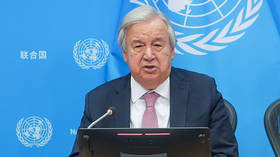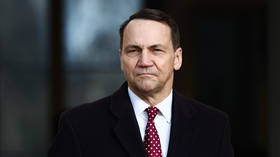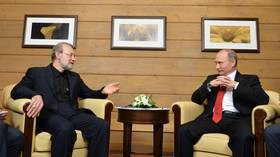‘First steps to fascism are quiet’ - Israeli activists against Boycott Law
Activists are continuing calls for people to stop buying goods from Israel, in protest over its expansion into Palestinian land. In Israel, the Boycott Law adopted half a year ago makes it illegal for critics to speak out against settlement building.
Shortly after the legislation was adopted, human rights groups asked the Supreme Court to repeal the law and they are hoping the court will meet their demands.Gershon Baskin is a wanted man in Israel for his outspoken views against the government's policy of settlement expansion.It is ironic because if it was not for this left-wing Israeli activist it is doubtful Israel would have secured a recent prisoner swap that saw Israeli soldier Gilad Shalit exchanged for Palestinian prisoners after five years in captivity. Gershon says it was his contacts within Hamas that allowed the two sides to reach an agreement. Now a controversial Boycott Law threatens to fine the erstwhile hero if he steps out of line. According to the activist, Israel’s recent legislative initiatives have a visible anti-Arab direction. “The appeal to the public is an anti-Arab appeal,” he said. “There is a competition of who is more strongly advocating a position which is anti-Arab.” What the Boycott Law says is that any Israeli could face legal action just for speaking out in favor of boycotting settlements. Human rights groups say that is a step in a wrong direction. “The first steps to fascism are quiet,” said activist and lawyer Gaby Lasky. “I hope that the Supreme Court gives a loud scream, telling us that fascism should not pass.” However, for now the Supreme Court is keeping quiet. The State Attorney again this month asked for more time to consider the arguments, angering Gaby and her team, who filed a petition to annul the law the morning after it was passed in parliament.Until the court rules otherwise, Israeli owners of companies based in the settlements can seek damages for boycotts called against their goods.For four years Yehuda Cohen has run a plastic sanitary and plumbing company in a West Bank settlement. Fifty per cent of his employees are Palestinians – workers, he says, who would be out of a job if his factory closed down. “I do not accept any boycott,” he said. “No Palestinian boycott, no right-wing boycott, no left-wing boycott.”“We are not a settlement, we are an industrial area that tries to give work to both people, that work and live from that area,” Yehuda Cohen added. “For that reason we should not put this industrial area under boycott." The Boycott Law is one of several controversial pieces of legislation being advanced by the Netanyahu government. A number of similarly criticized bills are currently under discussion in the Israeli parliament. Another bill aims to dramatically limit foreign funding of non-governmental groups critical of Israel. It is expected to receive Cabinet approval soon.“This is a very conservative right-wing coalition,” Israeli MP Nitzan Horovitz told of the parliament group pushing for the legislation. “They have a solid majority in parliament, but still they promote these bills which are perceived, not only by the left, but by the press, by the court, as not encouraging democracy or limiting free speech in Israel.” Many in Israel believe it is a way for the right-wing coalition government of Prime Minister Netanyahu to stay in power, but Gershon Baskin, for one, says he will continue to call for a boycott of the settlements. Far from censoring him, the Boycott Law has only strengthened his resolve to stop Israel’s growing onslaught on democracy.














